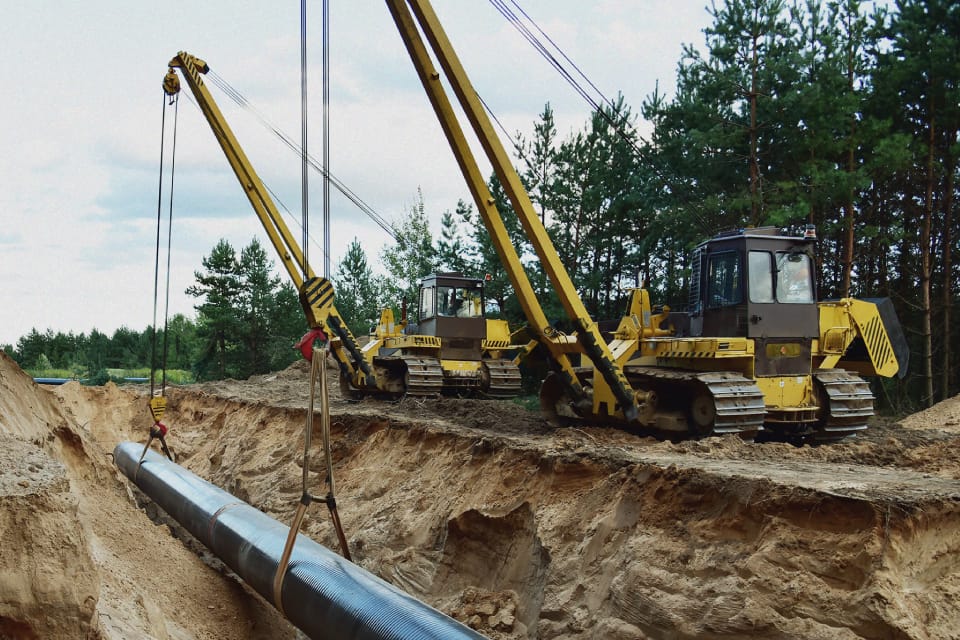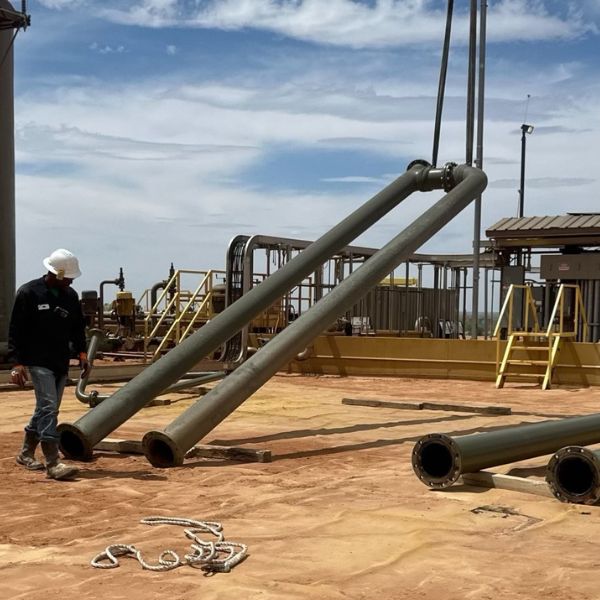The Crucial Overview to Recognizing Pipeline Construction Services and Their Significance
Pipeline Construction solutions are basic to the transport of essential sources such as oil, gas, and water. These services involve thorough preparation and implementation, adhering to stringent safety and security and environmental standards. As the market adapts to modern-day challenges, understanding its ramifications and elements ends up being increasingly crucial. What variables add to the expanding significance of these solutions in today's economic climate? The adhering to areas will discover these critical facets.
Review of Pipeline Construction Providers
Pipeline Construction services encompass a variety of activities important for the installment and maintenance of pipelines used to move numerous materials, consisting of water, gas, and oil. These solutions are essential for ensuring the secure and effective motion of resources from one place to one more. The process normally begins with detailed preparation and design, which takes into consideration regulative demands, ecological considerations, and logistical challenges.
When planning is complete, excavation and grading of the land are conducted to prepare the website for Pipeline installation. This is followed by the real laying of the pipes, which entails welding or joining areas together to create a continuous flow path. After installation, extensive testing is executed to guarantee integrity and security. Maintenance services are also provided to resolve any kind of issues that might occur gradually. Overall, Pipeline Construction solutions play a critical function in supporting infrastructure for energy and water circulation.
Trick Parts of Pipeline Construction
An effective Pipeline Construction project relies on a number of crucial components that guarantee the efficient and risk-free installation of the Pipeline system. Initially, complete website evaluations are vital, as they recognize the geographical and ecological elements that may affect Construction. Next, the option of proper products, such as pipes and fittings, is important for securing toughness and compatibility with the transported substances.
Additionally, progressed Construction techniques, including trenchless innovation and directional boring, enhance effectiveness and lessen ecological influence. Efficient task management is another vital part, collaborating labor, equipment, and timelines to satisfy task goals.
In addition, communication among stakeholders, consisting of designers, service providers, and neighborhood authorities, assurances positioning on job specifications and requirements. Ultimately, extensive quality assurance measures throughout the Construction procedure make sure conformity with sector criteria and take full advantage of the Pipeline's operational lifespan. Collectively, these components create the foundation of an effective Pipeline Construction project.
Safety Standards and Rules in Pipeline Construction

Boosting Regulatory bodies, such as the Occupational Safety And Security and Wellness Management (OSHA) and the Pipeline and Hazardous Materials Safety And Security Administration (PHMSA), established forth details demands that control Construction methods. These consist of protocols for tools usage, employee training, and emergency response treatments. By implementing these criteria, Construction companies not just secure their staff members but additionally protected public trust fund. Inevitably, strenuous safety actions add to the lasting success of Pipeline tasks, guaranteeing they satisfy both environmental and operational assumptions.
Environmental Factors To Consider in Pipeline Projects

Ecological considerations are indispensable to the preparation and implementation of Pipeline jobs. These projects must evaluate prospective influence on communities, water sources, and local wild animals. Carrying out comprehensive ecological impact evaluations (EIAs) is essential, enabling stakeholders to identify and mitigate threats prior to Construction begins.
Securing delicate areas, such as habitats and marshes, often needs applying specific style functions or alternative transmitting to minimize disruption. In addition, Pipeline operators are charged with creating methods for avoiding leaks and spills, which can have terrible effects on the environment.
Interaction with neighborhood areas is essential, as public worries can bring about task modifications that enhance environmental security. Conformity with policies established by environmental agencies guarantees that tasks satisfy sustainability criteria, fostering an equilibrium between facilities requirements and eco-friendly preservation. Eventually, dealing with environmental considerations not only safeguards nature however likewise advertises neighborhood count on and task stability.
The Function of Innovation in Pipeline Construction
Technology plays an important function in modern Pipeline Construction, improving effectiveness and precision. Advanced checking methods enable specific preparation and implementation, lessening ecological impact and job delays. Furthermore, the integration of automation and robotics streamlines procedures, minimizing labor costs and improving security on Construction sites.
Advanced Checking Strategies
Advanced surveying techniques play a crucial role in the successful execution of Pipeline Construction jobs. These methods utilize cutting-edge modern technology to guarantee exact mapping and evaluation of the terrain where pipes will certainly be mounted. Methods such as Geographic Information Systems (GIS), LiDAR (Light Detection and Ranging), and 3D modeling enable engineers to evaluate the landscape and envision, identifying possible challenges and ecological worries. By utilizing these innovative tools, teams can boost precision ready and positioning, greatly lowering the risk of errors during Construction. In addition, real-time data collection permits instant adjustments and informed decision-making throughout the task lifecycle. Ultimately, these evaluating developments add to boosted pop over to these guys performance, security, and sustainability in Pipeline Construction initiatives.
Automation and Robotics

Economic Influence of Pipeline Infrastructure
Pipeline infrastructure plays a crucial duty in assisting in and forming local economic climates trade. By providing a trusted news methods of transporting oil, gas, and other assets, pipelines minimize transport costs and improve supply chain efficiency. This facilities attracts investment, promotes job creation, and promotes economic development in bordering locations.
The Construction and upkeep of pipes add significantly to regional economic climates, developing many employment chances in various sectors, from engineering to labor. The increase of tasks frequently leads to raised costs in local companies, additionally boosting financial activity.
Furthermore, pipelines improve power security by ensuring a steady supply of sources, which is important for residential needs and industrial procedures. As regions become adjoined via Pipeline networks, they acquire accessibility to more comprehensive markets, increasing competitiveness and economic resilience. Subsequently, the economic influence of Pipeline infrastructure is complex, influencing both immediate neighborhood economies and more comprehensive local growth.
Future Fads in Pipeline Construction Services
The future of Pipeline Construction solutions is advancing in response to technological innovations, regulatory changes, and growing ecological considerations. Developments such as drones and robotics are streamlining evaluation and upkeep processes, boosting safety and security and efficiency. Automation is poised to reduce labor expenses and raise accuracy in Construction operations. Additionally, the enhancing emphasis on sustainability is motivating business to adopt environmentally friendly materials and practices, straightening with international initiatives to lower carbon footprints.
Regulatory structures are likewise adapting to attend to ecological effects, promoting greater transparency and liability in Pipeline tasks. Furthermore, the integration of clever technologies, consisting of real-time tracking systems, is anticipated to improve the integrity and efficiency of Pipeline networks. As power demands change toward renewable resources, Pipeline Construction solutions will likely see a surge in jobs associated to biofuels and hydrogen transport. In general, these patterns show a transformative period for the Pipeline Construction industry, focused on advancement and sustainability.
Often Asked Concerns
What Kinds of Pipelines Are Generally Constructed?
Various sorts of pipelines are frequently built, consisting of oil, sewage, water, and gas pipelines - Pipeline Construction Services. Each offers unique objectives, assisting in the transportation of vital resources across regions while adhering have a peek at these guys to safety and ecological regulations
For how long Does a Common Pipeline Job Take?
The period of a normal Pipeline project varies significantly, usually ranging from a number of months to a couple of years. Factors affecting this timeline consist of job intricacy, regulative approvals, and ecological considerations that need to be addressed.
Who Controls Pipeline Construction Business?
Pipeline Construction firms are managed by different federal, state, and regional agencies, consisting of the Pipeline and Hazardous Materials Safety Management (PHMSA) and state public utility commissions, guaranteeing compliance with safety and security and ecological standards throughout the Construction process.
What Are Usual Products Utilized in Pipeline Construction?
Usual products used in Pipeline Construction include polyethylene, steel, and pvc. Each material offers unique advantages such as resistance, longevity, and flexibility to corrosion, making them ideal for numerous applications in delivering fluids and gases.

Exactly How Are Pipeline Construction Expenses Approximated?
Pipeline Construction costs are approximated by assessing variables such as product costs, labor rates, job complexity, ecological factors to consider, and governing requirements (Pipeline Construction Services). Exact cost estimate warranties effective budgeting and project preparation throughout the Construction process
Pipeline Construction services include a range of activities vital for the installment and upkeep of pipes utilized to carry different substances, consisting of oil, water, and gas. A successful Pipeline Construction job relies on a number of key elements that guarantee the risk-free and effective installation of the Pipeline system. Advanced surveying strategies play a vital role in the successful execution of Pipeline Construction tasks. Numerous types of pipes are typically created, consisting of oil, water, gas, and sewer pipelines. Pipeline Construction costs are approximated by analyzing elements such as material expenditures, labor rates, job intricacy, environmental considerations, and regulatory demands.